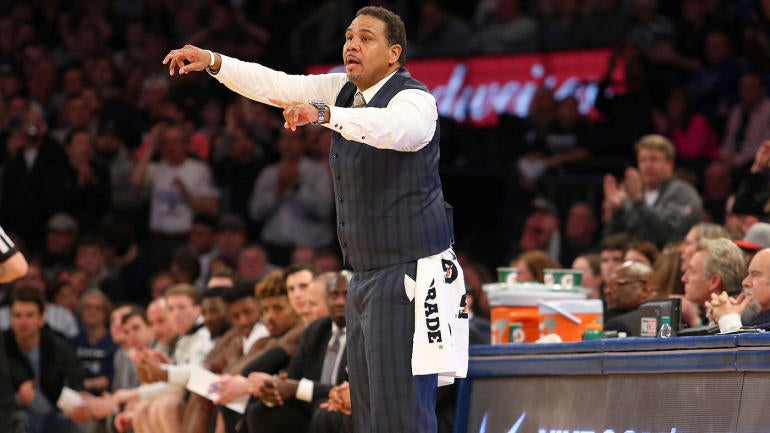
In just over a year, a significant portion of college basketball's coaching brain trust has left the sport, with Mike Krzyzewski, Roy Williams and Jay Wright headlining those opting to retire amid the sport's changing landscape. While the retirements of Williams, now 71, and Krzyzewski, 75, were somewhat expected due to age, Wright's decision came as a surprise to those outside his circle.
At just 60 and at a time when many of the sport's big-name coaches routinely work until age 70 or beyond, Wright's departure from the sideline makes him something of an outlier. As a well-polished figure in the sport with a couple of recent national titles, many assumed Wright was positioned to assume the leadership void created by Krzyzewski and Williams retiring. Instead, the void is widening at a time when college basketball needs trusted figures to chart its course.
As the proliferation of transferring and the arrival of the NIL era change what's required of college coaches, it's worth wondering if Wright's retirement may start a trend. After decades of increasing salaries, many high-major head coaches should be well-positioned to retire early if they grow fatigued of the sport's changes.
So which of college basketball's big-name coaches is most likely to follow in Wright's footsteps and retire before reaching their mid-60s? Our writers make picks for this edition of the Dribble Handoff.
Todd Golden, Florida
I talked with a coach the other night who predicted there will be more coaches fired and retired in the next five years than in any previous five-year period because of the changing landscape of the sport and the not-fun parts of the job that are expanding. He's convinced coaches with enough money will start getting out earlier. He doesn't think Jay Wright will be a story of one. And that's why I'm going with Golden -- not because he's already thinking about retirement a month after getting the Florida job, but because he's making $3 million a year at the age of 36. If he even remains in the sport until he's 60, do you realize how much money he will have earned by the time he's 60? And if the job of a high-major coach is as demanding and stressful then as it is right now, why keep working unless you're just addicted to the gym? As one coach recently told me, what's the point of having enough money to buy a beach house and travel if you don't have time to hang at a beach house or travel? -- Gary Parrish
Ed Cooley, Providence
Hours after Bill Self won the second national title of his career, I wrote this column in which I suggested it wouldn't be the battiest thing to imagine him stepping away from college hoops this offseason after accomplishing all he accomplished (and with inevitable heavy-handed sanctions set to arrive any month now from the NCAA and IARP). But I won't double up and pick Self here (though I can absolutely see him retiring before 65). Instead, I am going to the guy who has swore to me, on multiple occasions, that you will not find him coaching well after the age of 60. Cooley is 52 and poised to receive generational money in a restructured contract after guiding Providence to its first regular-season Big East title in program history (followed by a Sweet 16 run). With 221 PC wins, he's the best coach in program history at this point. He's got a great hold on life and doesn't need to attach himself to this job for another 10-plus years. Don't worry, Friars fans, you've still got him for plenty of time, but I'd be stunned if he's still on the sidelines come, say, 2033. -- Matt Norlander
Mark Few, Gonzaga
It's hard to envision a coach at or near the top of his game stepping away from basketball early -- even after seeing Jay Wright do it just a month ago -- so I'd certainly bet against Mark Few parachuting out of his position at Gonzaga anytime soon. He's got a great gig, he's consistently got great teams that dominate the WCC and perform well in March, and he's still only 60 years old.
But if he did walk away and retire early, would anyone really blame him? He's been coaching at Gonzaga either as an assistant or as its head coach since 1989. That's longer than I've been alive! And the last few years have felt like dog years on top of that, with two national runner-up finishes (2017 and 2021), a DUI charge prior to the 2021-22 season and presumably living with persistent pressure and frustration of getting close -- but not quite getting over the hump -- in a quest to win a championship.
Few's done everything you can do as a college head coach but win it all. He's a Hall of Famer. He really has nothing more to prove as much. If he stepped off the sidelines and decided three-plus decades of building a perennial contender was sufficient enough for him, then I'd tip my cap. It'd be well-deserved. But college basketball would miss him, absolutely. A legend of the game. So here's to hoping he's got many more great years -- maybe 7-10 more good ones? -- left in his tank. -- Kyle Boone
Tony Bennett, Virginia
At just 52, Tony Bennett already has a national title, five ACC regular season titles and two ACC Tournament titles on his resume. He's twice been named Naismith Coach of the Year and has made enough money to retire well. His father, Dick Bennett, retired after a long college basketball coaching career at age 62 in 2006, and the bet here is that Tony will do something similar.
If landing the "big" job was Bennett's aim, he sure could have done it by now. Instead, he's built a stellar program at UVA. By leading the Cavaliers to their only national title in 2019, Bennett secured his legacy at UVA. Now the question is how much of an appetite he'll have to soldier on in the new world of college basketball. If he retired at age 60 like Wright, that would still give Bennett another eight seasons to coach, which would bring his tally at Virginia to 21. Ironically, that's the exact number of seasons that Wright coached at Villanova. -- David Cobb

















